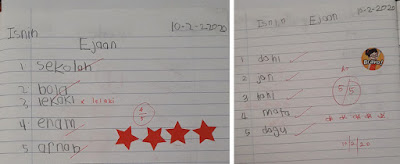1. I love watching
children spell some rather difficult words on The Great Australian Spelling
Bee. Apparently there are words they haven’t come across before and it’s
amazing to see them spell the words correctly. I suppose the
regularity of English spelling enable them to predict likely spelling patterns.
2. Spelling may not be
taught directly in language classes, but in primary schools and even in
kindergarten there are teachers who still give spelling quizzes to their pupils.
That brings me to my grandchildren, Umar and Nuraina. They have spelling quizzes
twice a week both for Malay and English on Monday and Friday respectively. For
each quiz five words are given beforehand for them to learn.
3. Umar and Nuraina were
quite good in spelling. My daughter cared about their intellectual development,
so she made time to guide them in their learning. She shared her fun experience
with me via WhatsApp messages.
4. Their teachers started
giving them spelling quizzes on 7 February. Umar started well getting full marks for his
first quiz. His teacher stuck five red star stickers on the page of his
spelling book. His sister got full marks too and her teacher stuck a praise sticker.
 |
| QUIZ 1* |
5. Nuraina got another praise sticker for her second quiz. Unfortunately,
his brother got only four stars. He told his mother
somewhat carelessly that only three people made mistakes including him. His
Chinese friend, Cotton, spelled ‘sekolah’
as ‘selahki,’ Afif, a Malay friend, spelled ‘arnab’ as ‘arnad’ and Umar spelled ‘lelaki’ as ‘lekaki.’
 |
| QUIZ 2 |
6. Umar got one star less for his third quiz yet again. His mother was
rather disappointed and I told her it was not the end of the world. Umar spelled
‘draw’ as ‘braw,’ but he spelled all the other four words correctly. Nuraina
spelled all words of different spelling patterns - flag, gift, gate, hand, horn
- correctly and earned another praise sticker.
 |
| QUIZ 3 |
7. I told my daughter to help them prepare
for their next quiz on the following Monday. She texted me that Umar was quite ready
for his coming quiz, but anything could happen in the actual situation. For
instance, Umar tended to mix d up with b. Anyhow, their mother took
heart from the siblings’ results on Monday. Both got all their spellings
correct. ‘Praise be to God,’ she texted, ‘they did so well.’
 |
| QUIZ 4 |
8. The following Thursday my daughter did revision with the siblings for
Friday quizzes. Umar seemed
able to spell all the English words fluently including ‘children,’ but when
asked to write them down ‘children’ was written with the ‘r’ missing. Thus I felt
a bit doubtful if he could make it.
9. It was Friday. I was curious when there was no message from my
daughter about the children’s spelling quizzes, but my wife had troubling news
from her that they didn’t fare as well. So I texted her that there seemed to be
no report for that day. And seconds later two unexpected photos appeared on my
mobile. It was a pleasant surprise. Nuraina did very well. Umar was splendid. Their
mother wrote: ‘I am a proud mummy.’ I responded: ‘You pulled mum’s leg. She’ll
pull your ear tomorrow.’
 |
| QUIZ 5 |
10. Around noon the
following Monday
my daughter texted me that Umar had made the same blunder again – mixing b up
with d. He spelled ‘datuk’ as ‘batuk’ thus earning one star less. Nuraina did
well earning another praise sticker. I suggested giving Umar simple drills on
the use of b and d, for example, asking him to spell and write down pairs of
words beginning with the two letters such as baku/daku, basi/dasi, bata/data, batu/datu, beli/deli, bini/dini, buka/duka, buku/duku and bulu/dulu.
 |
| QUIZ 6 |
 |
| QUIZ 7 |
13. Her mother comforted her with encouraging words. She began wondering what went wrong despite making time to help her daughter do revision. She was worried because Nuraina had to learn words with closed syllables quite unfamiliar to her. So she’d helped the little girl revise a number of times, but Nuraina was inconsistent. Her mother was partly blaming herself thinking that she might be pushing the girl a bit too hard. I suspected her technique was ineffective. I thought to myself, it’s not easy to become instant teacher.
 |
| QUIZ 8 |
15. I tried to help and texted her to tell Umar to spell ‘father,’ ‘mother’
and ‘brother’ stressing on the syllable ‘ther’ and ask him to spell ‘toge’ then
just add ‘ther.’ She OK’d it and admitted it was a good formula. Thus I thought
Umar had just to memorise ‘crocodile.’
16. Later I texted her: ‘… if you care to play with him, break up the word
into three syllables cro/co/dile. Write each syllable on a piece of paper.
Jumble up and ask him to rearrange. Do this several times. Then hide one
syllable and ask him to arrange the two syllables. Where must the missing
syllable be?’
17. My daughter thanked me
for the tips. I reminded her not to forget Nuraina. She was certain Nuraina
would make it because she’d been given quite simple words: ‘ring,’ ‘star,’ ‘vet,’
‘vest’ and ‘tea.’ I supposed my daughter carried out the tips with Umar, but
later when he was told to write down ‘crocodile,’ it became ‘crocobile.’ I
responded I was just about to remind her about the letter ‘d’ suspecting he might mix it
up with ‘b.’ Anyhow Umar and Nuraina did very well on Friday and I
congratulated them. |
| QUIZ 9 |
 |
| QUIZ 10 |
 |
| QUIZ 11 |
20. Those were the last quizzes before school was
indefinitely closed by reason of the Movement
Control Order (MCO) or lockdown imposed by the government to
contain the spread of Covid-19 disease affecting the population at large. And
now after a lapse of more than three months since the MCO came into effect,
school will reopen on 1st July which means that Umar and Nuraina will be able
to resume classroom learning to acquire basic skills in writing, reading and
counting.
21. Regarding their spelling
quizzes I’m glad that they never got lower than four marks out of five. Umar
got four marks three times, twice due to mixing b up with d. The other mistake
might be due to carelessness. Nuraina made only one mistake in the entire spelling
quizzes apparently on account of not being familiar with certain closed
syllables.
22.
I care about how they fare in whatever they do because
motivation is an important psychological factor in learning. They’d be
motivated if they fare well in what they do in classrooms. The main aim is to
build their confidence. I conclude with a quote from a Greek writer:
“In order to succeed, we must first believe that we can.”
*Pages from Umar’s (left) and Nuraina’s spelling books.
















